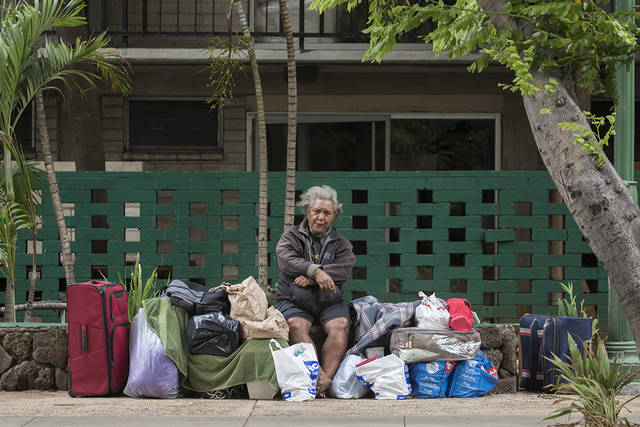Honolulu councilwoman seeks $21M to address homelessness in Hawaii

CINDY ELLEN RUSSELL / CRUSSELL@STARADVERTISER.COM
A homeless individual named Kalani sat along a wall at a Kuhio bus stop in Waikiki on Friday, August 24, 2018.
Honolulu Councilwoman Kymberly Pine has proposed that each of the nine Council members receive $2.3 million — or $21 million overall — to use in efforts to reduce homelessness.
Pine, vice chairwoman of the Council Budget Committee, submitted a budget amendment Friday that she said she hopes will encourage her colleagues to work with elected state officials in each of their districts to come up with “bold” ideas if the funding goes through.
“We need to go big and go bold and provide what is needed,” Pine told the Honolulu Star-Advertiser on Monday. “We have to all work together. We have to be braver and bolder in our solutions. It is not acceptable for people to be living on sidewalks, for people to be walking over human feces, to be finding needles in the sand where children play.”
Hawaii has the nation’s highest per capita rate of homelessness, and Pine said she has been frustrated with state and city efforts to address the problem. The city enforced its first “sit-lie” ban in Waikiki in 2014, leading to ongoing sweeps of the homeless and removal of stored property from urban sidewalks, but scattering them into neighboring communities and additional sit-lie bans across Oahu.
“I said, ‘You’re going to make the homeless more violent and make them more frustrated, and they’re just going to move across the street,’ which they have,” Pine said.
Pine’s budget plan is similar to former Council Chairman Ernie Martin’s proposal in 2015 to give each Council member $2 million to create tent cities and homeless hygiene centers in their districts, which for the most part failed to materialize. Since then the concept of tent cities has largely been shot down by state and city officials.
Don't miss out on what's happening!
Stay in touch with breaking news, as it happens, conveniently in your email inbox. It's FREE!
Only Councilman Joey Manahan has since welcomed a hygiene center in his district: the Punawai Rest Stop, which opened in November in Iwilei.
Pine hopes that new funding to address homelessness will lead state legislators to help with future homeless projects in Council districts. State officials “can help us with the social service and mental health services that only the state can provide,” Pine said. “That’s their specialty.”
Council members in neighboring districts also might consider pooling their money and resources to find regional solutions, she said.
Along with new money, Pine said the most important thing is that Council members “have to be bold, and they have to lead the projects, along with the administration. Just allow us to be creative and we will succeed. We know the solutions, but everyone is letting a lawyer tell them what they can and cannot do.”
For her Leeward district, Pine said there are many options for spending $2.3 million wisely, including helping to purchase land and tiny houses to relocate the 270-person homeless encampment next to the Waianae Small Boat Harbor called Pu‘uhonua o Waianae.
“These are people without homes that are fighting for their communities and for each other,” Pine said. “They’ve suffered tremendously with life situations, but they are ready to lift themselves up.”
Asked about chronically homeless people along the Leeward Coast who might not want to move off of the streets and beaches, Pine said:
“You can’t just say, ‘You can’t stay here.’ Where do they go? Right now we don’t have enough places for them to go. We don’t have enough places for them to get services.”




